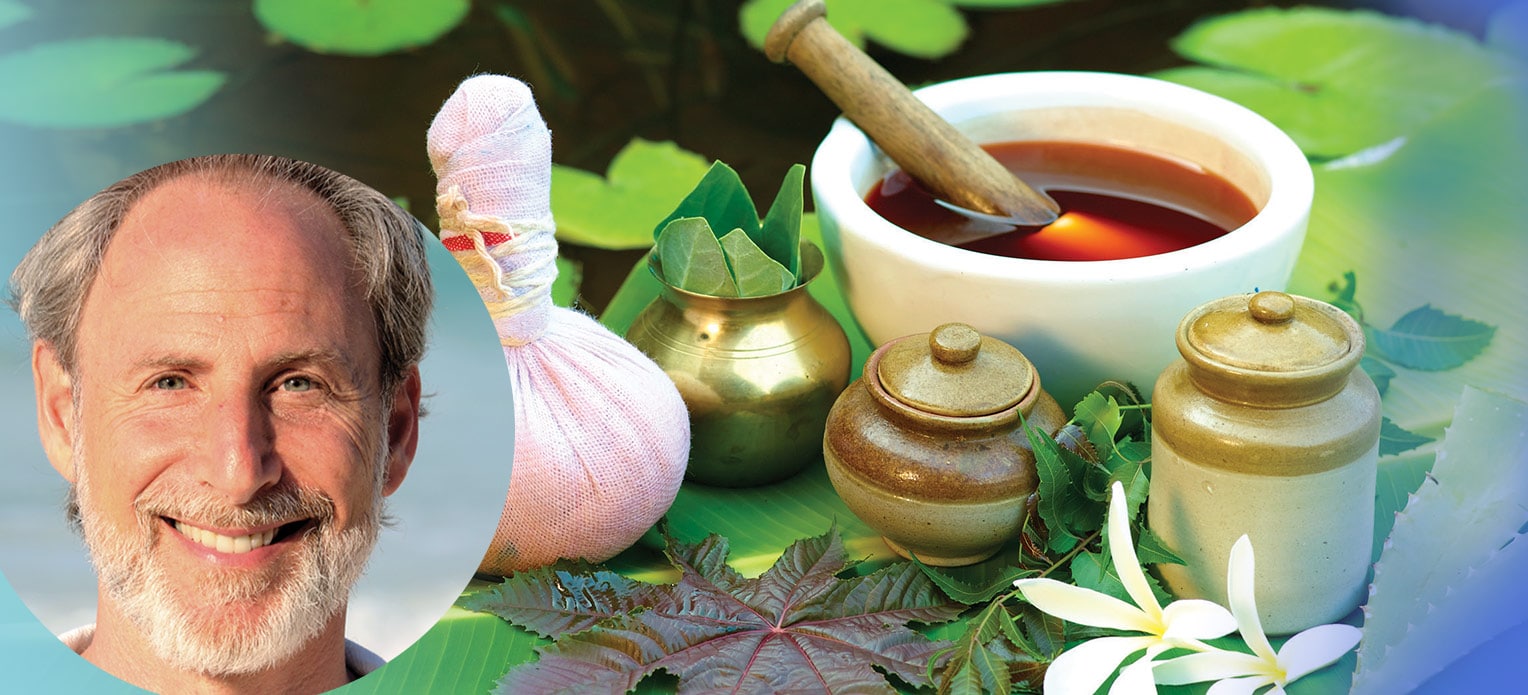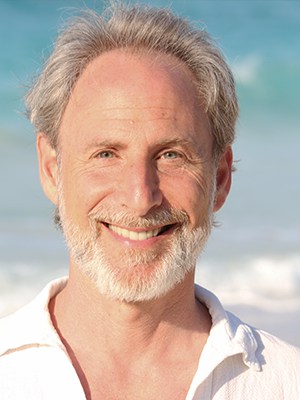
Ayurvedic Medicine: Disease Prevention and Maximizing Your Healing
A Body-Mind-Spirit Approach to Wellness with Dr. Marc Halpern
Program Type: Online Course
Date: 4 weekly sessions on Wednesdays, January 6-27, 2021
Time: 7:00-9:00pm EST
This 4-module program provides a guide for students to transform their personal health and well-being by integrating the knowledge of Ayurveda into their life.
During this course, students will learn the role of body, mind, and consciousness in health and wellness and explore the causes of disease and suffering. Students will also come to know their ayurvedic constitution and the nature of any imbalances that are present.
Key concepts including agni, ama, and ojas will be explored. With this knowledge, students will learn how to use the five senses to restore balance and health. Treatments to be explored include ayurvedic diet, lifestyle, color, aroma, sound, and touch therapies.
Module 1: The Role of the Body, Mind, and Consciousness in Health and Wellness
From an Ayurvedic perspective; body, mind, and consciousness are integrated. They cannot be separated. That which affects one aspect of our being affects them all. Hence, Ayurveda takes a truly holistic approach to both disease prevention and treatment.
Learning objectives
Students will learn the three causes of disease that weaken the body
- Parinama: Transformation caused by the movement of the mind
- Pragyaparadha: The failure of the intellect
- Asatmendriyartha Samyoga: The misuse of our senses
Students will learn the primordial cause of all suffering
- Avidya: Forgetting Your True Nature As Spirit
Students will learn the three pillars and their importance to the wellness of our body and mind.
- The importance of healthy digestion
- The importance of healthy sleep and rest
- The importance of healthy sexual expression
Breakout: Discuss how your choices are influencing your health. Discuss at least 1-2 that you make the benefit your health and 1-2 that you make the deplete your health. *optional
Personal Practice: Students will keep a journal during the program.
- Practice 1: Using the knowledge gained in this module, write down the deeper reasons why you make the choices you do.
- Practice 2: Commit to meditating each morning for one week – even if you only sit for 1-2 minutes. Write down how this practice helped you restore your connection to your True nature and the impact that had on your choices.
Module 2: Your Ayurvedic Constitution and Your Current State
Your Ayurvedic Constitution (prakruti) is the key to understanding who you are as a unique individual and how to prevent disease. Knowledge of your current state of doshic imbalance (vikruti) is the key to returning to balance. In this module, we will explore both of these concepts giving you a deeper understanding of yourself.
Learning objectives
Students will learn about the qualities of nature, the five elements, and the three doshas
- The 10 principals of opposite qualities that are inherent in the elements
- Ether, Air, Fire, Water, and Earth
- Vata, Pitta, and Kapha
Students will learn how the doshas combined together to create their own unique constitution
- Students will come to learn that we are made up of all three doshas in different proportions
- Students will learn their own constitution and how to apply percentages to the amount of each dosha within themselves
Students will come to understand how imbalances in the three doshas and their combinations affect sleep, appetite, digestion, elimination, menses, and their mind.
Students will explore their own symptoms and begin to label the doshic imbalance.
Students will be able to define their imbalance in terms of primary, second, and tertiary doshas.
Students will come to understand that based on their individual constitution, a unique lifestyle can be followed that supports optimal immunity.
Breakout: With a partner, look at each other’s facial features and discuss your constitution. *optional
Personal Practice:
- Practice 1: Using the knowledge gained in this module, determine your Ayurvedic Constitution in terms of percentages. Fill out the worksheet included with this course. For body structure questions you are not sure of, look at the slides from the course and also ask a friend what they think. Have fun with this. Your friend may also want to know their constitution. Help them figure it out.
- Practice 2: Using the knowledge gained in this module, determine your Ayurvedic imbalance (Vikruti) and use the terms primary, secondary, and tertiary if appropriate. Fill out the following worksheet. Have fun with this. Your friend may also want to know the nature of their imbalance. Help them figure it out.
Module 3: Agni, Ama, and Ojas – The Ayurvedic Keys to Building Immunity
Agni, Ama and Ojas are the most important physiological concepts in Ayurveda. Agni determines how well you digest food. Ama is the residue of poor digestion that causes toxicity in the body. Ojas is the factor that protects you against disease and maintains homeostasis or balance. When Agni and Ojas are healthy, no disease can affect you. In this module, we’ll explore these concepts and how to maximize the health of your immune system.
Learning objectives
- Students will be able to define agni, ama and ojas
- Students will be able to identify the state of their own agni and how that influences their digestion and elimination
- Students will be able to identify the state of their ojas and how that influences their resistance to stress and disease
- Students will be able to identify how much ama is present in their system
- Students will learn several steps they can take to reduce ama in their body and mind
- Students will learn the principles for building and protecting ojas
Breakout: Discuss your appetite and how this might be related to your agni. Also, discuss your overall level of ojas and one thing you can do to improve your ojas. *optional
Personal Practice:
- Practice 1: Using the knowledge gained in this module, determine the state of your agni (increased, decreased, variable, balanced), ama (mild, moderate, high) and ojas (low, moderate, high)
- Practice 2: Tongue cleaning: Begin the practice of tongue cleaning. Purchase a simple tongue cleaner. Check your tongue each morning and clean off the ama.
Module 4: Returning to Balance and Health
Utilizing an understanding of our constitution (prakruti) and imbalance (vikruti) we will explore the type of diet, lifestyle and sensory therapies that will support you to return to balance.
Learning objectives
- Students will learn the foods and spices that are best and worst for each dosha
- Students will learn what foods and tastes balance each dosha
- Students will learn what colors, aromas and sounds support balancing the doshas
Breakout Session: Discuss your current lifestyle with partner. Identify two lifestyle practices that support your health and two that compromise your health. Discuss why you participate in the practices that compromise your well-being. *optional
Personal Practice:
- Practice 1: Using the knowledge gained in this module design a breakfast, lunch and/or dinner that will help balance your vikruti. Include the proper spices to add to the foods. Note if the food is cooked or raw.
- Practice 2: Identify three lifestyle changes that you would like to eventually make to support your health. Commit to making one change immediately. In your journal, each day write down any struggles that arise to implementing this change.
Class Format
2 hour class sessions:
- 60-75 min of teaching
- 30 minutes of Q&A/discussion (will request questions aligned with the topics we’ve been discussing)
- 15-30 minute small group breakouts
Supplemental Support For Students
Facebook Course Community Group dedicated to this course
We will encourage that the Facebook group is for discussions and sharing, and ask that questions come through the proper channels to be covered in course sessions. We will moderate the closed group for the four weeks of the course.
Additional Details
This program is offered live through Zoom webinar with the availability for students to interact through Q&A with the presenter.
For enrolled students, a video recording will be available after each class in the event you miss a class or would like to review the content.
Requirements & Recommendations:
- No experience necessary. This program is open to beginners as well as advanced practitioners.
- Viewing Device: Desktop or laptop computer will provide the best experience, although you can also connect via a tablet or smartphone.
- Internet connection: High-speed broadband wired or wireless is best.
- Video: Download Zoom to your computer, or install the Zoom app to your device. For interactive group sessions, a webcam or integrated camera will allow others to feel more connected with you.
- Audio: Headphone speakers are recommended. If you wish to participate vocally, a headset with a microphone will be ideal.
*Discounts are not available for this course

Dr. Marc Halpern is the founder and President of the California College of Ayurveda. An Ayurvedic Doctor, Doctor of Chiropractic and a Sivananda Yoga Teacher, he is a leader in the development of Ayurveda in the West. His efforts toward building the profession in the United States have earned him awards in both the United States and India. In 1998, he co-founded the National Ayurvedic Medical Association and the California Association of Ayurvedic Medicine and was instrumental in establishing the standards for Ayurvedic Education. Dr. Halpern has written five textbooks plus the popular book, Healing Your Life; Lessons on the Path of Ayurveda. His newest textbook released in 2023 is Classical Yoga Therapy. Dr. Halpern is also the creator of the #1 best-selling meditation recording the United States; Yoga Nidra and Self-Healing.
Let's Stay In Touch
Join our email list to learn more about our in-person and online programs, courses, and free events.







